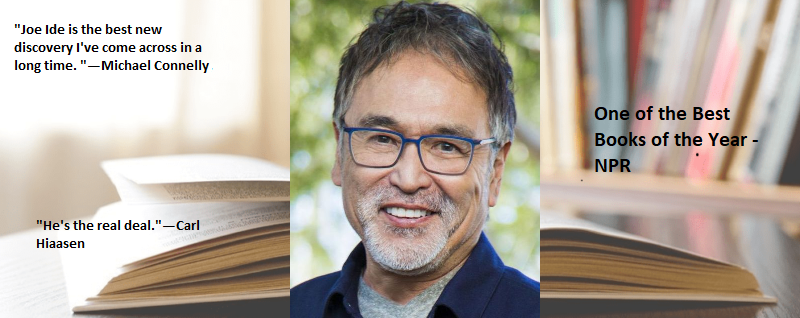[by Ross Browne]
Joe Ide is a brilliant, critically acclaimed author. He also turns out to be a refreshingly straight shooter on what aspiring writers need to know about the business of publishing and how to maximize their chances of making a successful career out of writing novels. While Ide works in the crime fiction genre, writers of any genre can benefit from what he shared in a writingworkshops.com session about what major publishers really want, how he went about the effort to deliver, and what he learned along the way.
Having read (and loved) the first three novels in the IQ series, I jumped at the chance to meet him online and hear what he had to say.
The Seed of a Successful Series
Commercial publishing success often starts with a great book idea: something fresh enough to feel new and different but similar enough to previous successes to cultivate confidence it can sell. Ide certainly struck gold on this front in his idea for the character of Isaiah Quintabe (IQ), a modern-day Sherlock Holmes of the ‘hood, hailing from South Central Los Angeles where Ide himself grew up. Not only did this idea create the foundation for a dynamite first novel, it also had the making of a great book series, which publishers love for reasons I explore here.
While I have little doubt that Ide’s pitch for the series turned some heads based on the strength of his concept alone, it’s his patience, persistence, and commitment to first-rate storytelling that got him where he is today.
Paying His Dues and Learning Story Craft
Ide’s path to learning how to break into print as a novelist started with nearly a decade of work writing screenplays, most of which were, in his own words, “pretty awful.” Feedback from an agent who looked at his stuff early on was not especially encouraging. “This is terrible,” Ide reports hearing in an interview on Crimereads.com. “This is boring. Who would want to watch this?”
Ouch!
Some authors might have been discouraged or even tempted to give up. But Ide took the feedback to heart, honed his skills, and eventually got good enough to option a screenplay to Disney. Screenwriting turned out not to be his calling, but the effort to learn how to write a salable screenplay surely paid off. As did his thick skin, persistence, and determination to learn how to tell a great story.
With six books now published in the IQ series, heaps of critical acclaim, and enough money rolling in to support himself living in southern California, Ide is enjoying success many writers would find enviable. There are two main elements to this success.
The first is understanding what mainstream publishing is (and isn’t), what it wants, and what authors must do to deliver. The second is dogged attention to and care for storytelling craft. Ide took a deeper dive into his perspective on both in this 75-minute session aimed at authors hoping to make a living writing commercial fiction. (That is, novels that sell well enough to support writing as a career.)
Want a Career Writing Fiction? Aim High—But Make Sure You’ve Got the Goods!
One thing Ide wants anyone aspiring to write commercial fiction to know is that publishing is one of the most competitive businesses on the planet. If your goal is to be a career novelist, he encourages you to think big and set your sights on landing a “Big Five” publisher because this is where you’ll find the supporting budget to launch a career. While there are of course many terrific smaller publishers out there doing fine work, your odds of being successful as a career writer go up enormously if you have the support of a major house.
You’ll have to be diligent in your effort to develop a number of different skill sets to be successful, but if you’re able to focus on the right things and develop some level of mastery over the art and craft of long-form narrative, a big-name traditional publisher will, in his opinion, give you the best chance of being able to make a living as a writer.
Reality Check: 10 Things to Know If You Want to Write Novels For a Living
1. There is no magic formula for writing a best-selling novel. (The notion that a rookie can do it in six months is hogwash.)
2. Publishing should not be perceived as an altruistic or philanthropic effort on behalf of literature. It is a business whose main goal is to make money. This means that to be successful in attracting a major publisher, you must deliver something that can attract readers in great numbers, generate buzz, and make money.
3. There is a finite amount of money being spent on books. Yours needs to be really good if you want a share of it. Major publishers won’t touch you until yours is.
4. The effort to generate buzz, to attract media coverage, and to “push” a first novel onto the radar of people who buy books is vital to success. Big publishers are good at this, and that’s why you need one behind you to have the best odds of making a living at fiction writing.
5. Ideas are overrated. The strength of your story concept or even your characters don’t matter much on their own. It’s the quality of the writing on the page that will make or break your career. And getting that quality to the level it needs to be requires much more work than many writers realize when they get started.
6. The gatekeepers of publishing are acquisitions editors and literary agents. These are the judges. These are the people you have to impress, all of whom face constant querying from thousands of other writers trying to do the exact same thing you’re trying to do. No one’s going to give you a break because you’re new. Your book either stands up to a seriously high level of scrutiny or it doesn’t. Most won’t—and you shouldn’t even think about submitting your manuscript until you’re sure yours does.
7. Pretty much all the big publishers out there want the same thing, and it’s usually not specific to genre or plot concept. What publishers want most is writers who can reliably deliver great book after great book. Michael Connelly, John Sandford, and Laura Lippman are examples of career novelists who get this and consistently deliver great writing and great voice. This is where the bar is set. You need to be on the same level of concept and execution if you want a shot, recognizing that most publishers don’t want one masterpiece but instead career writers who can generate revenue for years to come.
8. You must be realistic about money: how much you’ll get and how long it takes to get it. Most book advances (as of the early 2020s) fall between $25–100K, with $100K being a “very rare” outlier figure. Ide did get a $100K advance, broken up into multiple payments over the course of more than a year minus 15 percent to his agent. But since book advances are made against royalties, he didn’t see another cent until that advance earned-out and his publisher was in the black. Ide cautions that sometimes that doesn’t happen until the second or third book is in print, assuming a multibook deal—or it might not happen at all. But patience is a virtue, no matter what. And landing your first book deal may not mean it’s time to quit your day job.
9. Screen adaptations are rare and not always as lucrative as you might think. Most options from major companies range from $5K to $7,500. (Ide was offered $22.5K for IQ, only thanks to a bidding war.) His agent considered this extraordinary.
10. Aspiring writers should be prepared for the long haul. Learning craft takes time. Again, there are no magic formulas, and no one new to the game is going to write a bestseller in six months. The time and effort involved in learning to write at this level is more like learning to become a teacher or carpenter or engineer. You must commit to that reality and accept that time frame if you’re going to be successful. Most writers rush and focus on the wrong things. Don’t be one of them if you want to succeed!
On Crafting a Great Story
Ide is a passionate believer that great stories can’t exist without memorable, fully realized characters. “Everything stems from character,” he says. One key to writing great characters is feeling a high degree of empathy with them. You must also understand their motivations and put them to good use in the story.
He doesn’t say so explicitly, but I take this to mean your character’s desires must be infectious. The more readers want what your characters want, the more they’ll care about the outcome of the story.
Your job as the author is to get fully into the head of any viewpoint character you create and make sure you’re showing the world through their eyes. The true essence of a character, he says, might be found in what they think and feel before, during, and after throwing someone off a rooftop.
Ide encourages authors to be especially mindful of their protagonist’s lifestyle and areas of expertise in that character’s initial introduction to readers. Archetypes are fine as a jumping-off point, he says, but you should be sure to make your character is fresh on some level and unique enough to be follow-worthy.
And when it comes to villains, Ide agrees with screenwriter John Rogers that the best bad guys are good guys—if not heroes—in their own minds.
In his own writing, Ide is highly attuned to the importance of character vulnerabilities, which, while important to cultivating a fully realized character, need not be complicated. If you haven’t given thought to your protagonist’s insecurities and inadequacies, then you probably should. Good characterization will put attitudes and opinions on display. Shortcomings and hang-ups too. No one wants to read about perfect people because they simply don’t exist.
One way Ide puts this to use in his own writing is in IQ’s relationships with women. One might expect a guy this smart and well respected in his community to be a suave, confident lady’s man. But it is not so—not even close. Another vulnerability is the damage and emotional baggage IQ has carried ever since a senseless hit-and-run killed his brother Marcus when Isaiah was only 17. This is a driving force for his character and impacts many events in the series.
On Dialogue
What your characters say is as important as how they feel and how they see the world and their own role in it. On the topic of dialogue, Ide says its primary purpose is expository and story-driving in some respects, but it is also important in revealing character. Vocabulary, word choice, syntax, and cadence are the main building blocks of character voice and should be carefully considered.
On Action
Ide came across as strong in his conviction that plenty of action and excitement is a good thing in commercial fiction but that it must be effectively contextualized by what the protagonist wants and the emotional stake he or she has in it. A character’s emotional stake—what’s on the line if they succeed or fail—is usually what gives meaning to the story’s events. You want to be diligent in quickly establishing your main character’s objective and keeping that in the forefront. Action for action’s sake won’t resonate. It needs to support a goal that readers identify with.
On Pace
It’s no surprise that Ide believes a good pace—creating the experience of a true “page-turner”—is super important for authors looking to break into print. So he took a moment to consider why some books are page-turners and others aren’t.
The main reason authors fail with pacing is quite simple in Ide’s view: not enough happens. The solution is to make sure interesting story developments keep coming, one after another after another. If more than a few pages go by without this, pace will suffer and reader attention will lag.
But developments won’t always involve external plot events. Changes or shifts in how a character thinks about something or attempts to resolve internal issues are valid as well. The trick is to keep things moving with developments that have interest and meaning to readers.
On Rewriting
One topic I found especially interesting was what Ide has to say on the topic of rewriting. Rewriting, he says, is not the same as reading through your manuscript and tweaking things here and there. It’s taking a long hard look at what’s wrong, what doesn’t work, and what can work better—then making an uncompromising effort to fix it.
How can this be better? Clearer? More exciting? Sharper?
If you can’t find three opportunities to rewrite on each and every page after your first draft is completed, that probably means you’re not trying hard enough.
Ide confessed he rewrote Book One of the IQ series 27 times in his effort to ready it for the eyes of agents and publishers.
On Knowing Your Genre
First-time writers are well advised to read a lot and make sure they’re familiar with the standards of whatever genre (or subgenre) they’re writing in.
Success in publishing follows relentless determination to master writing craft—relative to the genre, of course. This means reading voraciously and paying attention to the mechanics of great writers who have succeeded on the path you aim to trod. Study what you read and try to understand the craft of it. Maintain curiosity about how books work and what makes stories compelling. Apply what you learn as best you can and don’t rush the effort to continually try to raise the bar on the quality of your writing and storytelling.
On Reading (and Listening) Like a Writer
Reading like a writer means reading the work of other authors actively with the intent of studying and learning rather than just being entertained.
Ide believes the best writers are keen observers of human nature. “Talk less and listen more,” he advises. “Know when to shut up and pay attention.” One benefit of this is that it will allow you to collect anecdotal information about people: how they act, what they say, how they say it, and why. This archive of observations can be a gold mine when it comes to your effort to populate your novel with interesting, distinctive characters who are convincingly rendered.
Consider the expertise of the people you listen to in real life and the characters you write on the page. Consider their lifestyle, worldview, opinions, and attitude. Think about what’s going on in their heads and how what they won’t say explicitly manifests in words and behavior. Enflesh your characters with what you see in real people.
Ide speaks persuasively about the value of human observation and how important it is to listen—really listen— to folks you talk to as you stockpile insights and information to help make your fictional characters come alive. To do this job, you must love writing, not just the cerebral act of imagining a story or the physical act of putting words on a page.
A Parting Word of Encouragement
It’s hard to overstate just how spot-on Joe Ide is on the topic of the work it takes to write a really good first novel. And in an era when so much debut fiction is being published so quickly—often without benefit of the care and attention Ide puts into his own work—it’s good to consider this insider’s perspective on the full scope of effort involved in making the leap from unpublished to successfully published.
While some of his insights won’t apply to the same degree to authors who set their sights elsewhere than on multibook contacts with major US trade publishers, I hope anyone reading this will be motivated and inspired by Ide’s guidance, no matter how you aspire to publish. (And if I or any of my colleagues here at The Editorial Department can help, please drop me a line.)
More information about Joe’s books is available at joeide.com. You can also take a closer look at Ide’s handling of irredeemable antagonists here.
Thanks for reading, and please don’t hesitate to contact me if you have questions or need help with a novel you’re trying to get published.







